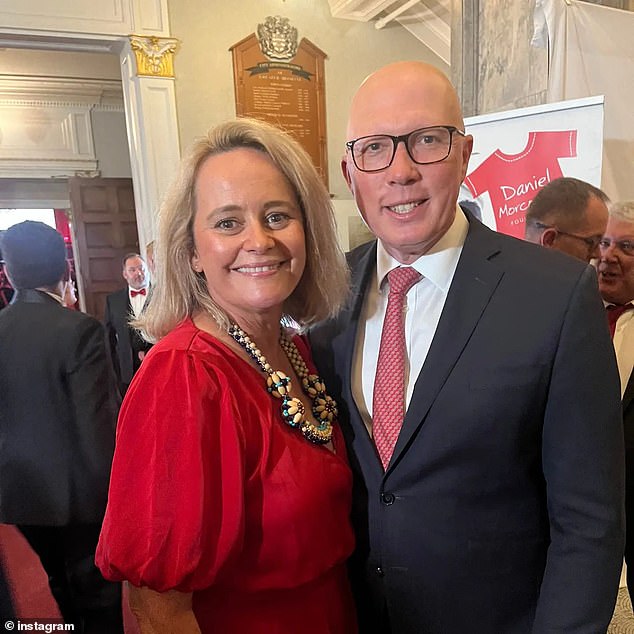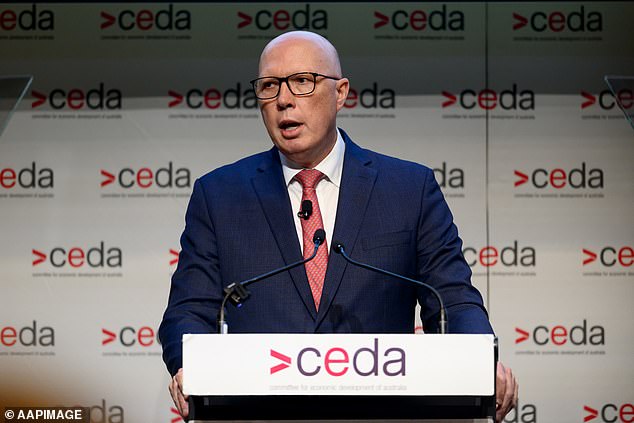Will the times suit Peter Dutton as he attempts to unseat a prime minister for the first time in almost 100 years?
The opposition leader has the coalition tied in the polls and a federal election is expected in the next six to seven months.
Although Prime Minister Anthony Albanese enjoyed an early honeymoon when he came to power, it has been all downhill for the Labor Party since then.
The debacle of the Voice referendum campaign put the prime minister and his government in an out-of-touch position with more than 60 per cent of the Australian population.
Labor then began to renege on election promises on tax cuts and superannuation, at the same time as the Reserve Bank increasingly raised interest rates, courtesy of stubbornly high domestic inflation.
The cost of living crisis has weighed heavily on Labour’s mandate, and Dutton has used the crisis to question the government’s economic management credentials.
With the crisis in the Middle East taking center stage, Dutton is once again at the forefront, denouncing Labour’s soft response to everything from Hezbollah flag-waving protesters to antisemitism on university campuses.
Dutton is well aware that the Coalition enjoys a considerable advantage over Labor when votes are asked on the credentials of the major parties to handle national security issues.
But the pre-election campaign that Dutton is mounting against Albo also confronts head-on the notion of woke politicking.
The opposition leader seems happy to present himself as an advocate of the widespread rejection of modern political correctness as out of control and anathema to the current zeitgeist.
Will he be proven right?
Peter Dutton is leaning into his image as one of the tough men in Australian politics, rather than trying to be someone he is not.
We saw it this week with Dutton’s response to a question from an ABC journalist seeking to draw comparisons between the State of Israel and the terrorist organizations of Hamas and Hezbollah.
Dutton put civility aside to contemplate the stupidity of the false equivalence that underlines the questions being asked.
He took no prisoners.
Early in the Labor government’s term, Dutton saw his role as dual: political survival and maintaining his fractured coalition following Scott Morrison’s heavy electoral defeat.
That was a loss that not only handed over Labor power, but wiped out a new generation of Liberal leadership hopefuls, as the Teals captured more than a handful of once-safe Coalition seats.
At the time, Dutton was cautious and even tried to present himself as the less tough man in the Liberal Party than his reputation has always been.
The assignment was intended to broaden its appeal beyond the portfolios it had long held.
Dutton’s reputation was as a leader of the far right of the Liberal Party. His social conservatism on political issues was accompanied by his tough attitude toward national security and defense.
The concern even among his followers has been whether he will be able to appeal electorally.
However, perhaps times are changing to suit a politician of Dutton’s style. Anti-system rhetoric that speaks directly. Drawing attention to the club that Labor can sometimes become in government.
Before the business community turned against Labor over new, unelected policies on industrial relations, Dutton was keen to distance himself from the love between Labor and business on post-material issues.
The Voice to Parliament was just one example, but there were other issues as well.
With the cost of living firmly impacting people’s lives, Dutton appears to have had his eye on the ball from the beginning, when Albanese was playing in the sandbox.
That’s at least what focus group research from both major parties reveals.

Dutton (seen at an event linked to the Daniel Morcombe Foundation) has discovered that his personal approval figures are no longer a drag on the party vote.
That’s why election timing is a difficult issue for the Labor Party. Are they going early to finish the election before perceptions worsen, or are they late to take advantage of events and timing to improve the Labor Party’s political fortunes?
Albo seems to opt for the latter, hoping for an interest rate cut before the campaign begins (or perhaps even during it).
The premier also hopes an election defeat for Queensland Labor can help voters vent their frustrations on the political left before he has to face their wrath.
However, surveys reveal that The Prime Minister has a much lower net negative satisfaction rating among Queenslanders than his Labor state premier.
For Dutton’s part, his personal approval numbers are no longer a drag on the party vote.
If anything, his leadership style could give voters reasons to return to the Coalition after just one term out of power.
With Morrison firmly in the rearview mirror, Dutton is a much more authentic type of leader than the former prime minister, even if Dutton is not everyone’s cup of tea.
Leaders like Dutton tend to move closer or further away from who they are.
Dutton is now leaning forward and polls so far suggest he is being rewarded for it. It is happening just at a time when Australians are wondering what the Labor Party stands for and whether it can be trusted.
Albo’s beta male personality contrasts sharply with Dutton’s alpha male personality.
No first-term government has lost a reelection bid since 1931, which was during the Great Depression.
The current economic climate is not that bad, but people are still having a hard time.
Dutton’s path to victory is narrow, especially given the spectacle of contests against the Teals in once-safe Liberal seats.
Ultimately, an outright victory for the Coalition and Dutton could be a bridge too far after a single Labor term.
But if the opposition leader can campaign successfully enough to take away the majority from the Labor Party, reducing Team Albo to a minority government that depends on the support of the Greens to remain in power, any move for an opposition leader the opposition in its first term would be a successful exit.
And you never know: maybe the timing will suit Dutton even more.

